#gamedoc
Explore tagged Tumblr posts
Text
Week 4: Digital Community and Fandom: Reality TV Case Study
Reality TV
Definition of Reality TV from different angles:
Reality TV, a dominant television format for the past two decades, spans various genres including gamedocs, dating shows, makeover/lifestyle programs, docusoaps, talent contests, court programs, reality sitcoms, and celebrity-based shows (Murray & Ouellette, 2004).
Reality TV has changed over the years:
Reality TV has shifted away from its origins in documentary and social observation, now characterized by camera-ready individuals dramatically performing in emotionally charged scenarios, facilitated by semi-scripted formats, on-set manipulations, and post-production enhancements. Formerly portrayed as 'ordinary people', participants now hover on the brink of celebrity status, lured by the prospect of leveraging the attention garnered from their reality TV dramatic appearances for diverse forms of capital (Kavka, 2018, p. 7).
Authenticity:
Reality TV mirrors contemporary cultural concerns regarding authenticity in the midst of societal fragmentation, accentuating a broader societal desire for authentic connections and meaningful existence in an era marked by increasing uncertainty and individualism. Additionally, it champions the idea of embracing one's innate traits and values, influencing current understandings of self-identity, especially in relation to queer sexualities and gender identities (Lovelock, 2019, pp. 7-8).
Case study: Sisters Who Make Waves (Chị đẹp đạp gió rẽ sóng)

"Sisters Who Make Waves", a reality TV music show that aired on VTV3 on October 28, 2023, is the Vietnamese adaptation of a popular Chinese program aired on Mango TV. The show unites female artists aged 30 and above from diverse entertainment sectors such as music, film, modeling, acting, and business. With courage, participants push past personal boundaries to revive their youthful aspirations and ambitions on the music stage.
Talent show
This show could be characterized as a talent show, which is structured as a competition based on some form of talent (as this term is normatively construed) (Lovelock, 2019, p. 9). Firstly, the participants are represented to be actualizing and affirming an innate (and thus authentic) talent for singing, dancing, composing, playing different instruments, or whatever the show concerns through their involvement in the show. Secondly, the emotional turbulence resulting from the pressurized context of the mediated competition is mined as spectacles of apparent affective authenticity.
Liveness
Broadcasting the show on YouTube according to a specific schedule is an effective method to enhance two-way communication and foster a sense of "liveness". The comment section on YouTube serves as a platform for shared social interaction, allowing individuals from different generations to come together, whether in person or through technology. This enables the audience to watch and engage with the show in real-time, enhancing the sense of immediacy and connection.
Living brands
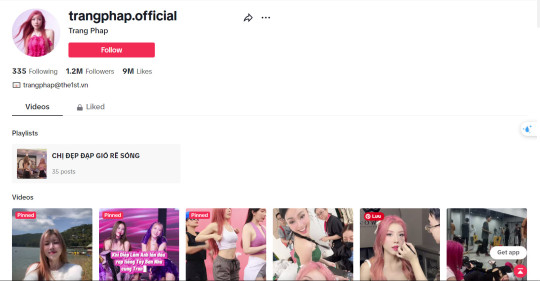
The show, featuring renowned artists like Diep Lam Anh, Huyen Baby, Trang Phap, My Linh, etc., embodies the concept of 'living brands' in a capitalist setting, where individuals strive for social recognition by transforming into branded products, especially pertinent amidst economic instability and gendered consumption patterns (Ouellette & Hay, 2008). These artists leverage various platforms, from TikTok's Behind The Scene footage to Facebook posts, enhancing their fame while reinforcing the show's positive message: empowering women to defy age stereotypes, pursue passions, and push their limits. This content not only encourages women aged 30 and above to explore new opportunities but also fosters unity and support among them, ultimately advocating for feminism. Through social media, participants extend their moment of fame, generate income, and share unfiltered perspectives on show events, challenging perceptions of reality and authenticity in TV production.
Discussion
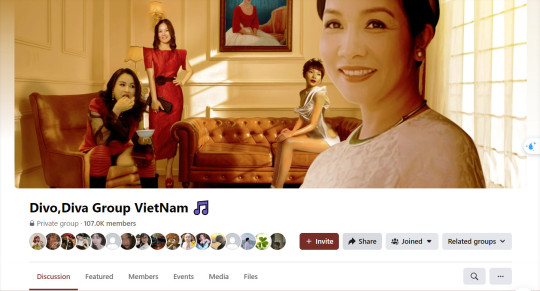
Moreover, it is true that Reality TV is a genre that is designed to elicit talk and shared opinions. In the case of this show, "Divo, Diva Group Vietnam," a Facebook group with over 100,000 members critiques on-screen actions, scrutinizing participants' behaviors and questioning the authenticity of the content. Moreover, discussions on this platform are infused with puns, quips, animated gifs, memes, and sarcastic commentary as audiences vie for likes and shares. Notably, key lines, scenes, and expressions are repurposed as memes, circulating widely and acquiring new meanings beyond their original context (Deller, 2019, pp. 158-159). Such memes have the potential to prolong the relevance of the reality show and its participants.
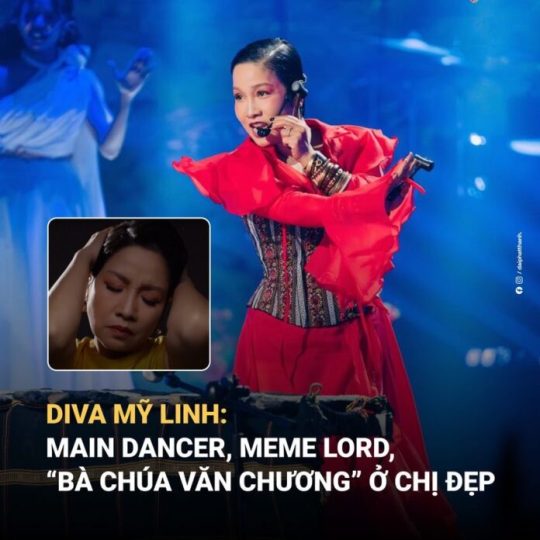
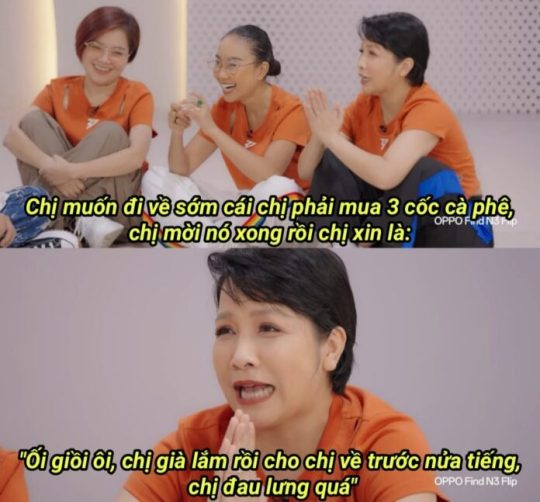

References
Deller, R., 2019. Chapter Six: Reality Television in an Age of Social Media. In: Reality Television: The TV Phenomenon That Changed the World. s.l.:Emerald Publishing.
Kavka, M., 2018. Reality TV: its contents and discontents. Critical Quarterly, 60(4), pp. 5-18.
Lovelock, M., 2019. Reality TV and Queer Identities: : Sexuality, Authenticity, Celebrity. s.l.:Springer International Publishing AG.
Murray & Ouellette, 2004. Reality TV: Remaking Television Culture. s.l.:NYU Press.
Ouellette & Hay, 2008. Better Living through Reality TV: Television and Post-Welfare Citizenship. s.l.:s.n.
1 note
·
View note
Text
Week 4: Can foreign reality TV shows create a significant impact on attracting online communities when imported to Vietnam?
Reality TV shows have been gaining greater shares of viewership across different audience groups largely because of their potential that widen the avenue for the sharing of opinions and driving argumentative discourse (Deller 2019, p. 153). The shows are inclusive of many forms such as gamedocs, dating programs, talent shows, and reality sitcoms amongst others (Murray and Ouellette). The Vietnamese market has also seen a significant penetration of foreign television programs. The recent reality TV formats acquired for broadcast in Vietnam include: 'Running Man,' '2 Days 1 Night', 'Brother Overcame a Thousand Thorns,' 'Street Woman Fighter.' These shows were received with phenomenal success in their home countries, where they left a deep impression on their viewers. A question remains whether they would keep their phenomenal appeal when they are adapted to the Vietnamese culture.

Street Woman Fighter Vietnam (Nữ hoàng vũ đạo đường phố) is a real dance competition adapted from the original Korean format. Its first episode was released on July 27th, and it features six competing crews including So Fire, F.E.D, OOPS!, HanoiXGirls, SSWarriorZ, and Salad. All dance crews contain well-recognised female dancers of the industry with different styles and genres.

Korea has been known as the birthplace of a variety of well-known reality TV shows. Understanding that Vietnam has the potential, with a large number of talented female dancers whose ability in both choreography and competitive dancing is equal to the international standard, the producers of the original show decided to choose Vietnam as the first foreign host for this program. This initiative aims to provide a platform for young dancers to showcase their talents and creativity (Phan Trai 2024).
In order to set a strong and long-lasting foundation the show has strived to maintain the original format to attract viewers who are used to the former Korean version. However, since the production is now based in Vietnam, it has to fit the local culture. An instance of this is the performance of the dance crew F.E.D during the Mega Crew mission, in which they used Vietnamese music and set up the formation in a star shape, representing the emblem on the national flag. Specifically, the emergence of well-known faces in the Vietnamese entertainment industry, such as popular judges and master hosts Hari Won, Diep Lam Anh, Gil Le,... has contributed to its appeal and viewership.

The show broadcast both through the HTV7 channel and YouTube, enjoyed an incredibly active online audience. This is somewhat understandable considering the quality of social media viewership, which essentially tends to be a communicative practice, best linked with the scheduling of a live show (Deller 2019, p. 157). Consequently, it places viewers in a position where they have topics of commonality they can discuss each week on various social media platforms. It is a sense of collective empowerment that provides greater ease and immediacy, especially when they can identify and unite behind a common interest such as fandom for a television series (L'Hoiry 2019, p. 11). Notably, the diverse responses to individual performances can elicit a whole gamut of opinions; where one may show eagerness, the same feelings might not be shared by another person. These differences in views mostly result in the creation of different online communities based on a wide array of outlooks.
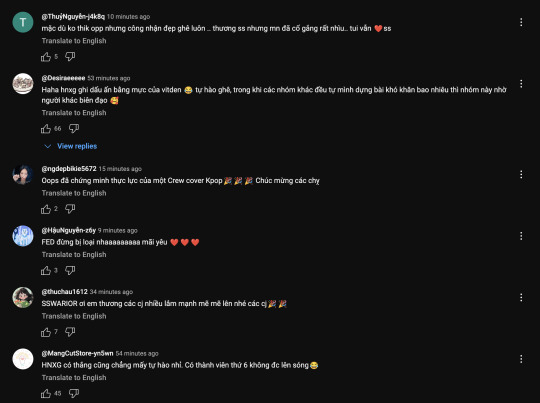
In short, Vietnam opens a very huge opportunity to produce reality TV shows based on foreign formats, owing to the diverse audience demographics in the country. However, more is indeed required to be done to enhance quality and creativity by the producers themselves to catch more viewership in the long term.
References:
Deller, R.A. (2019) Reality television: The television phenomenon that changed the world [Preprint]. doi:10.1108/9781839090219.
Murray & Ouellette, ‘Week Four Reality TV Case Study 2023 Slides’, MDA20009 Digital Communities, Learning materials via Canvas, 2023, viewed 04 October 2024.
L’Hoiry, X. (2019) ‘Love Island, social media, and Sousveillance: New Pathways of challenging realism in reality TV’, Frontiers in Sociology, 4. doi:10.3389/fsoc.2019.00059.
Phan Trai (2024) Show đình đám hàn quốc ‘Nữ hoàng vũ đạo đường phố’ đến Việt Nam, Tạp chí điện tử: Người Đưa Tin. Available at: https://www.nguoiduatin.vn/show-dinh-dam-han-quoc-nu-hoang-vu-dao-duong-pho-den-viet-nam-204649700.htm#:~:text=Nh%E1%BA%ADn%20th%E1%BA%A5y%20Vi%E1%BB%87t%20Nam%20c%C5%A9ng,v%C3%A0o%20cu%E1%BB%91i%20th%C3%A1ng%207%2F2024.(Accessed: 04 October 2024).
0 notes
Text
Reality TV and Digital Publics: An Exploration
This week’s lecture focused on the complex interplay between reality TV and social media, highlighting how digital publics form and engage within the public sphere. The discussion provided historical context, explored key concepts, and examined the role of social media in reshaping audience interaction and engagement.
Key Concepts: Digital Publics and the Public Sphere
The public sphere is traditionally defined as a space where private individuals come together to discuss and influence political change (Kruse, 2018; Sakariassen, 2020). With the advent of social media, this concept has evolved into multiple digital publics, which are micro-communities formed around specific platforms and issues. Examples include hashtags like #Auspol and Tumblr fandoms.
Historical and Contemporary Context of Crowdsourcing
Crowdsourcing is not a novel concept. Historical examples such as the British government's Longitude Prize in 1714 and the Oxford English Dictionary’s reliance on 800 readers in 1884 illustrate early forms of distributed problem-solving (Chrum, 2013). In modern times, platforms like Ushahidi have been pivotal in crisis mapping, highlighting how digital technologies can mobilize citizens and unify views during crises.
Reality TV: Definitions and Audience Paradoxes
Reality TV, a dominant television genre for over 20 years, encompasses a wide range of sub-genres including gamedocs, talent contests, and celebrity-based programs (Murray & Ouellette, 2009). Despite its popularity, reality TV is often cited as the least favorite genre among surveyed audiences (Statista, 2022). This paradox underscores the complex relationship audiences have with reality TV, where they engage heavily but express disdain for the genre.
Reality TV and Social Media: Transforming Engagement
Reality TV has leveraged social media to diversify markets and enhance audience participation. Social media platforms enable reality TV stars and fans to interact across various channels, fostering a dynamic and participatory culture (Arcy, 2018). This multiplatform engagement creates digital publics where everyday political talk and social issues are discussed, reflecting the intersection of personal and political spheres (Graham & Hajru, 2011).
Case Studies: Malaysian Digital Publics and Tumblr
In Malaysia, platforms like WhatsApp and Facebook dominate digital public spaces, enabling citizens to mobilize and engage in community building (Castells, 2015). Similarly, Tumblr provides a safe space for marginalized voices, particularly for trans and gender-diverse individuals, offering a supportive environment distinct from platforms like Facebook and Instagram (Byron et al., 2019).
Implications for Broadcasters and Audiences
The convergence of reality TV and social media benefits broadcasters through increased viewer engagement and ratings. However, it also exposes participants to intense public scrutiny and potential harassment. The phenomenon of reality TV fame highlights the thin line between celebrity and ordinary individuals, with social media amplifying both positive and negative interactions (Porter, 2015).
Conclusion
The exploration of reality TV and digital publics reveals the transformative impact of social media on audience engagement and the formation of digital communities. These platforms facilitate dynamic interactions that blur the lines between personal and political spheres, reflecting broader societal trends and challenges. Understanding these dynamics is crucial for comprehending the evolving landscape of media and public discourse.
References
Arcy, J. (2018). The digital money shot: Twitter wars, The Real Housewives, and transmedia storytelling. Celebrity Studies.
Byron, P., Robards, B., Hanckel, B., Vivienne, S., & Churchill, B. (2019). Safety, visibility and interaction on LGBTQ social media platforms. Media International Australia, 171(1), 127-138.
Castells, M. (2015). Networks of outrage and hope: Social movements in the internet age. Polity Press.
Chrum, J. (2013). Crowdsourcing: Definition and History. Harvard Business Review. Retrieved from hbr.org.
Graham, T., & Hajru, A. (2011). Reality TV as a trigger of everyday political talk in the net-based public sphere. European Journal of Communication.
Kruse, M. (2018). The public sphere: Definitions and theories. Journal of Communication Inquiry, 42(1), 5-17.
Murray, S., & Ouellette, L. (2009). Reality TV: Remaking Television Culture. NYU Press.
Porter, T. (2015). Digital fandom: New media studies. Routledge.
Sakariassen, H. (2020). Public sphere revisited: Theories and debates. Media Studies Quarterly, 38(2), 89-104.
Statista. (2022). Popularity of reality TV among U.S. audiences. Retrieved from statista.com.
0 notes
Text
Digital community and fandom
When talking about reality TV, what is the first thing that comes to mind? Entertainment? Comedy? Or popular shows that you have watched for example, Master Chef and The Amazing Race. These shows are all categorised under reality TV. So what exactly is reality TV? Reality TV is a hybrid television genre that is characterised by its appeal to the real and that follows celebrities or regular people as they go about their lives in unusual or daily settings (Dong 2022). It has a wide range of programmes, such as gamedocs, reality sitcoms, gamedocs, dating shows, lifestyle shows, talent shows, court programmes, and celebrity-based shows (Misman 2024). Reality TV has been a popular genre of television programming for the past 20 years, however many academics studying media trace its origins to the 1950s, 1970s, and earlier (Misman 2024). Reality TV has grown to be a highly popular part of prime time television, a "phenomenon" that is sustainable throughout the world and has greatly stoked public passion (Dong 2022).
Just to give an example of a popular reality show, it’s called Jinny’s Kitchen, a reality TV show from South Korea. It is a continuation of the popular reality TV show “Youn’s Kitchen” directed by Na Young Suk (Nam 2024). It is about a South Korean actor, Lee Seo Jin, who was previously a cast member of Youn's Kitchen being promoted from the director to the boss of the new restaurant which is Jinny’s Kitchen (Nam 2024). With 4 more other restaurant employees who are Park Seo Jun, Jung Yu Mi, Choi Woo Shik and Kim Tae Hyung. They will be selling South Korean street food in Bacalar, Mexico to the locals. With Youn’s Kitchen already being famous, Jinny’s Kitchen blew up as Kim Tae Hyung was introduced as part of the line up, a member from the popular boy band BTS.
Now in 2024, we have emerged into an era of digitalisation and one of the most important form of marketing is to use social media. New audiences and markets can be reached through social media. Television programmes with a significant social media following outperform those without in terms of ratings, according to statistics (Misman 2024). Because people's attention spans are getting shorter, audiences need stimulation from several sources at once to stay engaged. Broadcasters can keep their audience interested by creating engaging social media content that they can engage with.
When talking about celebrities, there will be fandoms for every celebrity. Every celebrity will have their own fans. So what is fandom? A fandom, or subculture, is a group of people who are passionate about a particular work of popular culture and who communicate and bond with one another in addition to having a common interest (Merskin 2008). Fans' activities are becoming more diverse and expansive as a result of the rise of social media, which provides a handy means for them to communicate with their idols and organise and execute a range of activities (Misman 2024). For example, Weverse, ao social media app used by South Korean artists to communicate with their fans and update them about their daily life. There might even be some shows that are based on certain artists just limited to app users.
To sum up, reality television has developed into a diverse and widely watched genre by fusing entertainment with real-life events. This has drawn viewers' interest and imagination. The dynamic aspect of the genre is exemplified by programmes like "Jinny's Kitchen," which draw viewers in by fusing ordinary activities and unusual surroundings with celebrity appeal. With the progress of digitalisation, social media has emerged as a crucial instrument for promoting these shows, allowing broadcasters to reach a larger audience and keep viewers interested with dynamic and interesting material. In addition, the popularity of social media platforms has led to the growth of active fan communities, which enable fans to interact with their heroes more and take part in a range of activities. Reality TV has a symbiotic relationship with social media and fandoms that highlights the genre's lasting appeal and substantial influence on modern popular culture.
Reference
Dong, W 2022, The Cultural Politics of Affect and Emotion : A Case Study of Chinese Reality TV, transcript Verlag, Bielefeld, Ebook Central (ProQuest).
Merskin, D 2008, Fandom, Wiley Online Library, viewed 10 May 2024, <https://onlinelibrary.wiley.com/doi/10.1002/9781405186407.wbiecf009>
Misman, N 2024, ‘Week 5: Digital Community and Fandom: Reality TV Case Study’, MDA20009 Digital Communities, Learning materials via Canvas, Swinburne University of Technology, 15 April, viewed 10 May 2024.
Nam, S 2024, ‘Update: Park Seo Joon, Jung Yu Mi, And Choi Woo Shik Confirmed To Return With Lee Seo Jin For "Jinny's Kitchen 2"’, Soompi, 15 February, viewed 10 May 2024. <https://www.soompi.com/article/1642615wpp/jinnys-kitchen-confirmed-to-return-for-season-2>
1 note
·
View note
Text
Week 4: Digital Community and Fandom: A Reality TV Case Study
Reality TV has been a dominant form of television programming for the last 20 years. It includes gamedocs, dating programs, makeover/lifestyle, docusoaps, talent contests, court programs, reality sitcoms, and celebrity based programs (Murray and Ouellette 2009). Reality television is a genre that is designed to elicit talk and shared opinions ... not only in terms of judging the participants' behaviors but also by speculating on the authenticity of what they are watching. This talk is not only found in homes, workplaces and schools, but also proliferates online in forums, web comments, blogs, vlogs and social media' (Deller 2019). In the mid-late 2000s, the emergence of competitors in the form of social networking sites such as Facebook, MySpace and especially Twitter. While reality is a genre that privileges ‘liveness’, on Twitter, the liveness is often enhanced by on-screen hashtags during broadcasts. One of the attractions of Twitter is the presence not only of the audience but also of producers, hosts, experts or actors and guests participating in the program who also tweet their viewing ( Deller, 2011).
Social Media opens up new markets and audiences and the memes and GIFs from these shows. People who join these shows can get a chance for fame, image and self-presentation online.
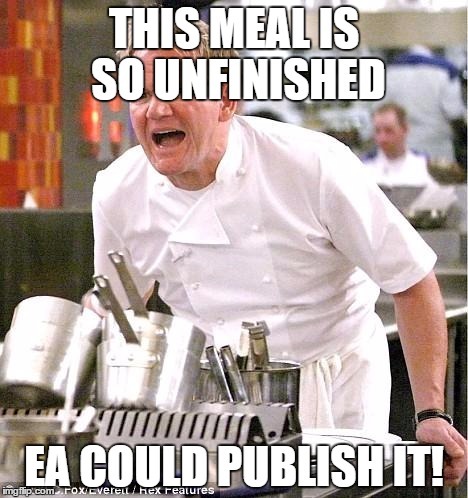
Take for example famous chef Gordon Ramsay's show Hell's Kitchen. Thanks to the success and maintenance of appeal after 20 seasons of this show, Gordon Ramsay - the show's brand character - has become a highly influential chef on social networking platforms and has become more and more popular through memes, gifs on social networking platforms like Twitter, Facebook...
References:
Deller, Ruth A 2019, Extract: 'Chapter Six: Reality Television in an Age of Social Media' in Reality Television: The TV Phenomenon That Changed the World (Emerald Publishing).
Murray, S & Oullette, L 2009, ‘Reality TV: Remaking Television Culture’, NYU Press.
0 notes
Text
Week 4 of mda20009 :Reality Tv
"A type of television programming… [aiming] to show how ordinary people behave in everyday life, or… situations, often created by the program makers," is what reality television is defined as. (English Dictionary Collins, 2021). The Real World, an MTV program that "brought so-called people to television in what were nonacting roles… [and] viewers of the [program] saw themselves in these faces," is credited with popularizing the genre in the 1990s (Huff, 2006). From that point on, pop culture and society at large have been greatly influenced by reality television. TV shows like "Survivor," "Big Brother," and "Idol" were extremely popular in the 2000s. The enormous popularity of the original show led to the creation of these programs in numerous other nations. (Hill, 2014).
Reality television is a large and extensive television genre that includes dating shows, talent shows, celebrity-based shows, court shows, gamedocs, and lifestyle shows (Murray & Ouellette, 2009). Other well-known reality TV programs include "MasterChef," "Queer Eye," "The Bachelor/Bachelorette," "Keeping Up with the Kardashians," and "Next Top Model."
Reality TV is hugely popular in Australia, where shows on major commercial channels like Channel 7, Channel 9, and Channel 10 consistently rank at the top of the ratings. In the social experiment "Married at First Sight Australia," which airs on Channel 9, strangers are paired together by "experts" and legally wed (albeit the marriage is not binding) to determine whether they are compatible (Nine TV Access, 2015). During the last season of the
show, which debuted in 2021, often drew in one million viewers per episode, making it the highest-rated show of the evening (TV Tonight, 2021).
But since social media was developed, viewers' perceptions of and interactions with reality TV have changed. Televoting, an SMS-based opinion surveying method, was once a way for viewers of reality television to voice their opinions (Definitions, 2021). This is a typical practice on many other reality television shows that let the public make decisions. It was implemented in the early seasons of Australia's "Big Brother," when fans could send an SMS for whom they wanted to save. Social media has greatly expanded the amount of engagement that the different interactions viewers have with reality shows. People can discuss shows and exchange ideas or thoughts about events that may have happened on a reality show they were watching on social media platforms. This creates "buzz," and little conversations have the potential to grow into larger ones that may involve the public. According to Bone (2020), platforms are therefore "[becoming] essential to the success of [reality] television."
Reality TV celebrities also depend significantly on social media to grow their following or maintain it after their show has concluded. Certain reality shows specifically target individuals who already enjoy a substantial online following in an attempt to boost their show's visibility and audience. Other reality TV show contestants could desire to attempt and keep their admirers by utilizing social media to sustain their star status. When "individuals [develop] a distinctive public image for commercial gain and/or cultural capital," this is referred to as "self-branding" (Khamis et al. 2016). Reality stars frequently turn to social media sites like Instagram to become influencers and maintain their notoriety.
References
Bone, B, 2020, How Social Media Changed Reality TV. https://medium.com/swlh/how-social-media-changed-reality-tv-c4cb3e725a86
Definitions, 2021, Televoting, https://www.definitions.net/definition/televoting
Hill, A 2014, Reality TV, Taylor & Francis Group, London
Huff, R 2006, Reality Television, ABC-CLIO, LLC, Westport
0 notes
Text
GAMEDOC - METAL GEAR SOLID - LE ORIGINI DEL MITO
[vc_row][vc_column][vc_column_text]
https://www.youtube.com/watch?v=1Idw9JzvKac
Ciao Ragazzi e Benvenuti alla Seconda puntata di GAMEDOC La Storia, la nuova rubrica che parlerà a modo nostro di console, videogiochi e personaggi che hanno fatto la storia del gaming!
Abbiamo pensato di raccontare di un’altra saga cult che ha fatto la storia del gaming, e ci siamo detti…perché no!? Raccontiamo…
View On WordPress
#big boss#eternalgamers.it#gamedoc#hideokojima#kojima#la storia#metalgearsolid#mito#origini#solid snake#yoji shinkawa
1 note
·
View note
Link
Some recommended watching! NoClip does amazing documentaries and this time around its on the Demon’s Souls remake by Bluepoint Games and Japan Studio. I’ve always been a fan of souls games, but I had never played the original Demon’s Souls. It was such a delight to play this visual feast on PS5.
#gaming#documentary#gamedocs#gamebler#gaming blog#demons souls#fromsoft#souls#insightful#bluepoint games#japan studio#sony#playstation#ps5
1 note
·
View note
Text
Week 4, Digital Community and Fandom: Reality TV Case Study
Week 4! Reality TV! I can't say that personally I'm the biggest reality TV enthusiast but I do enjoy watching the clips of Love Island or MAFs that get uploaded to Tik Tok.
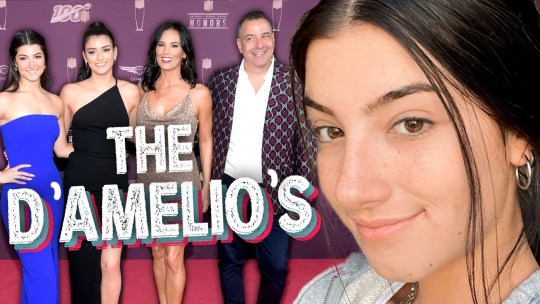
Clearly, this week's topic was Reality TV and despite how common reality TV shows and series are, people surveyed about their viewing behaviour consistently state that the genre of Reality TV is their least favourite. Even with consistently winning ratings. Where 61% of respondents in this same study say they wish that there was less Reality TV, as there is too much in our media.
I'd say that I have to agree with those who are being surveyed, if I had to pick something to watch on TV, a reality show or series would not be my first choice.
To provide some context, Reality TV has many varying definitions but here are three in which I thought were the most comprehendible. Reality TV can be defined by Oxford Dictionary as “A type of television programming which aims to show how ordinary people behave in everyday life, or in situations, often created by the program makers, which are intended to represent everyday life” (Collins English Dictionary).
Furthermore, reality TV has dominated television programming for the last two decades and can be found as far back in history as the 1950s.



Being such a broad genre it covers many subgenres such as gamedocs, dating programs, makeover/lifestyle, docusoaps, talent contests, court programs, reality sitcoms, and celebrity based programs (Murray and Ouellette).
Firstly, reality is a genre that privileges ‘liveness’, especially in shows that are broadcast live and implement some form of voting. ‘Liveness’ helps the media emphasise its role as some- thing that can unite society. (Deller, 2019, pg. 155).
From this week's lecture I learnt quite a lot and found these key points very interesting;
Reality TV is a genre that is designed to elicit talk and shared opinions
The idea of 'Tweeting with the Telly': this refers to the idea that viewers are often encouraged to use the app 'Twitter' to form interactions over TV.
Through emphasising their liveness it presents the shows as a communal experience. Whereby Twitter plays a huge role in this, hyping up its liveness through hashtags on screen throughout the programming and on occasion verbally through a host to encourage the viewer to take part within the discussion.
Social Media multi platform engagement; allowing for diversification within the audiences and markets. Increasing the opportunities for reality stars across social media platforms (cameos, brand sponsorships, podcasts etc).
Reality TV creates digital publics for everyday political talk; performs valuable (yet often dismissed) social function .
For this week's required reading, I felt as if there was a lot to comprehend and take on board and felt a little bit overwhelmed but I found this one point quite eye opening as I could definitely apply it to my own experiences.
Whereby the genre of Reality TV lends itself extremely well to humour, through the form of gifs, puns, quips, memes and sarcastic commentary in the hopes to feel relatable to the audience. Creating a 'brand' for these tv shows and series. Playing a key role in their social media as it boosts engagement for their accounts and the communities created.
References for this week:
Deller, Ruth A, (2019) Extract: 'Chapter Six: Reality Television in an Age of Social Media' Download 'Chapter Six: Reality Television in an Age of Social Media'in Reality Television: The TV Phenomenon That Changed the World (Emerald Publishing).
Jenkins, C. (2023) Who leaves Tonight's MAFS Australia commitment ceremony?, Back to the Bay. Available at: https://www.backtothebay.net/news/2023/03/27/josh-and-caitlin-leave-married-at-first-sight-australia-in-2nd-commitment-ceremony/ (Accessed: March 20, 2023).
Love Island (2015 TV series) (2023) Wikipedia. Wikimedia Foundation. Available at: https://en.wikipedia.org/wiki/Love_Island_%282015_TV_series%29 (Accessed: March 20, 2023).
Milne, E 2023, ‘MDA 20009 Week Four Reality TV Case Study 2023 Slides.pptx’, MDA20009 Digital Communities, Learning materials via Canvas, Swinburne University of Technology, 20 March, viewed 20th March 2023.
Tik Tok star Charli D'Amelio is getting a REALITY SHOW!- Awesomeness TV (2020) Google search. Google. Available at: https://www.google.com/search?q=REALITY%2BTV%2BON%2BTIK%2BTOK&tbm=isch&ved=2ahUKEwjhx8-szoX-AhWaHbcAHX42C-MQ2-cCegQIABAA&oq=REALITY%2BTV%2BON%2BTIK%2BTOK&gs_lcp=CgNpbWcQAzoECCMQJzoFCAAQgAQ6CAgAEIAEELEDOgcIABCKBRBDOgQIABADOgYIABAIEB46BwgAEIAEEBhQkwdYhB9g6SFoAHAAeACAAZACiAGIJJIBBjAuNi4xNpgBAKABAaoBC2d3cy13aXotaW1nwAEB&sclient=img&ei=RYcmZKGRHZq73LUP_uysmA4&bih=660&biw=1440&rlz=1C5CHFA_enAU990AU990#imgrc=--WAfjeD9Zi4gM (Accessed: March 20, 2023).
What is reality television? (2022) FutureLearn. Available at: https://www.futurelearn.com/info/courses/pictures-of-youth-introduction-childrens-visual-culture/0/steps/43948#:~:text=%E2%80%9CA%20type%20of%20television%20programming,%E2%80%9D%20(Collins%20English%20Dictionary). (Accessed: March 20, 2023).
0 notes
Text
Reality TV (Week 4)
Reality television is the most watched, yet most hated genre of television. It has loosely been split into subgenres, including: gamedocs, dating programs, makeover/lifestyle, docusoaps, court programs, and reality sitcoms (Ouellette & Murray 2004).

Reality television is described as ‘unscripted action and interaction’ (Nabi 2007), usually between ordinary people who provide exaggerated and transgressive performances which ‘promise the thrill of unpredictability with the security of televisual contrivance (Kavka 2019, p. 7).
This ‘televisual contrivance’ and the performances of the participants bring forth the idea of authenticity (Deller 2019, p. 163). In reality television, the participants cannot be depicted in an authentic way: the narratives demand drama, and even if they try to remain inline with a ‘truer’ perception of themselves, they are still subject to the manipulation of editors and producers. However, the participants are also able to utilise other platforms, particularly social media, to develop a more personalised representation of themselves. As reality television stars continue to discuss their shows on social media, an ‘ongoing narrative…across media platforms' (Arcy 2018, p. 488) is created. This is known as transmedia storytelling, which allows for diversified markets, new forms of engagement and audience participation, as these programs can now keep a closer connection to the audience between episodes, as well as garner a further audience through the inclusion of these other media platforms. Transmedia makes it so television is less reliant on itself as television, it now has supplemental components. In particular, stars will often interact with fans in a variety of ways and thus encourage the formation of parasocial relationships.
Reality television is ‘designed to elicit talk’ (Deller 2019, p. 153) and the social media spaces—the digital publics—where these television programs are discussed in detail hold frequent political discourse especially surrounding discrimination of race, gender and sexuality. Although, it is important to distinguish that it is audiences that are addressing the implicit biases they see in reality television, as reality television tends to remain hegemonic, assumedly for the comfort and easy-viewing of audiences not wanting to have their values challenged. Even explicitly queer shows like RuPaul’s Drag Race will still enforce gender rigidity as ‘the format of [the show] understands drag to be men that transform themselves into women’ (Chetwynd 2020, p. 33) and provides little wiggle-room for gender fluidity, despite this being an integral aspect of the lives of drag queens.

As a medium, television programs are restricted to industry standards and must maintain the status quo to at least an extent, otherwise the ratings, funding, and ultimately the show itself could be jeopardised. However, transmedia elements like social media are not as limited, allowing for further nuance and discussion, both from reality show participants as well as audiences.
>REFERENCES ARE UNDER THE CUT<
Arcy, J 2018, ‘The digital money shot: Twitter wars, The Real Housewives, and transmedia storytelling’, Celebrity studies, vol. 9, no. 4, Routledge, pp. 487–502.
Chetwynd, P 2020, ‘Postfeminist hegemony in a precarious world: Lessons in neoliberal survival from RuPaul’s Drag Race. (Critical essay)’, Journal of international women’s studies, vol. 21, no. 3, Bridgewater State College, pp. 22-35.
Deller, RA 2019, ‘Reality television in an age of social media’, Reality television: The television phenomenon that changed the world, Emerald Publishing Limited, pp. 141–175.
Murray, S & Ouellette, L 2009, Reality TV : remaking television culture, 2nd edition., New York University Press, New York.
Nabi, RL 2007, ‘Determining dimensions of reality: A concept mapping of the reality TV landscape’, Journal of broadcasting & electronic media, vol. 51, no. 2, Taylor & Francis Group, Philadelphia, pp. 371–390.
Ouellette, L & Murray, S 2004, ‘Introduction’, in Murray, S & Ouellette, L (eds), Reality TV: Remaking television culture, New York University Press, New York, pp. 1-16.Velour, S 2023, Profile, viewed 23 March 2023, <https://www.instagram.com/sashavelour/?hl=en>.
#Okay I found this more interesting than I initially thought#...which is only because I wrote about queer tv lol#don't mark me down for these tags plz it's tumblr culture#mda20009#essay#analysis#reality tv
1 note
·
View note
Text
Week 4: Reality TV Case Study
The paradoxes of reality TV viewers. Despite reality TV's great ratings, many individuals still claim that it is their least preferred form of entertainment. Reality TV is the type that people in Australia and the US despise the most, according to surveys. According to a US survey, comedy is the genre that spectators are most likely to enjoy, with 88 percent of respondents favoring it and only 7 percent disliking it. Reality TV, on the other hand, was at the opposite end of the spectrum, with 48% of respondents having a negative opinion of it. I know what it means. Although many media researchers look further back to the 1970s, 1950s, and earlier for its development, reality TV has been a dominating kind of television programming for the last 20 years. Gamedocs, dating shows, makeover/lifestyle shows, docusoaps, talent shows, court shows, reality sitcoms and celebrity-based shows are all included in this broad category. There are two areas where social media are used. Social media's cross-platform involvement broadens markets and audience participation and gives reality stars and fans more opportunities to connect through podcasts, recaps, conventions, and cameos. The second is that reality television generates online communities for regular political discourse and serves an important social purpose.
Prominent individuals on social networking sites will fabricate drama about their personal lives in order to attract attention when they want it. The wide category that includes games, dating shows, lifestyle and makeover shows, docusoaps, talent shows, court shows, reality sitcoms, and celebrity-based shows. Social media is used in two different areas. There are more options for reality stars and followers to interact through social media's multiplatform engagement, which diversifies markets and audience participation. The second is that reality television serves an important social purpose and develops the digital public for regular political discourse. Prominent users of social networking sites will fabricate drama about themselves and exaggerate aspects of their personal life to attract attention.
Reference:
Case Study: Reality TV – Survivor | Immediate Assistants Events 2017, Immediate Assistants Events | Saving Lives, Reducing Risks, Controlling Costs., viewed 22 March 2023, <https://iaevents.tv/case-study-reality-tv-survivor/>.
Week 4: Readings: 2023-HS1-MDA20009-Digital Communities 2022, Instructure.com, viewed 31 March 2023, <https://swinburne.instructure.com/courses/49643/pages/week-4-readings?module_item_id=3179746>.

0 notes
Text
REALITY TV SHOWS

I rarely watch any Vietnamese reality show, mostly because watching Disney or foreign science programs has been my habit since I was young. So yes, I had no sense about reality shows, let alone understand their impact on society and many related problems. But as soon as I looked at the lecture, I finally had some ideas to write.
What are reality TV shows?
This term refers to a broad genre of shows that include gamedocs, dating shows, lifestyle, talent competitions, celebrities-based programs, and so on. (Milne 2022)
Reality shows in Vietnam
I believe this term is more well-known as “gameshow”, although it only covers a part of the former’s meaning. Some well-known gameshows in Vietnam include Bố ơi mình đi đâu thế, Bạn muốn hẹn hò, Sao nhập ngũ, Bước nhảy hoàn vũ, and the list goes on. Although there are many gameshows in Vietnam, many of them contain imported formats from the foreign countries such as the US and Korea. These countries are masters of creating interesting and engaging reality formats so that players (is this the right word??) can entirely show their true selves, thus creates diverse circumstances. I think this factor is the “soul” of reality TV, therefore makes it distinct from other types of shows and attracts many viewers. What happens on the shows are stimulatively discussed on social media and digital newspapers for young people, making the shows become “on the trend”. Reality TV shows do not neccessarily rely on TV to be successful-it creates digital publics for discussion (Milne 2022)-perhaps also a way of practising the public sphere. Take an example of Bạn muốn hẹn hò (a dating reality show), many players become the center of controversy because of the weird viewpoints, such as:

a young woman wanting her boyfriend to do everything for her but not vice versa,

or a middle-aged highlight girlfriend’s virginity.
These characters are mentioned in a lot of Facebook posts and comments, and most of the viewers criticize them but some also protect the players. Both the positive and negative opinions are expressed on social media. Other than discussing the show content, I believe that Vietnamese watch these kinds of shows only for entertainment, and not many shows create huge social impact. Vietnamese families can spend time together watching a reality TV show, see how the characters communicate and play with the show format, discuss this person’s pretty face or that person’s weird behavior, and all of them serve the demand of entertaining after long working/studying hours. This discussion can also appear on social media as I have mentioned. But there’s one thing that I noticed that, I cannot find any show created for discussing politics. Unlike what I see on Twitter where many people can express their opinions about this, and they can also relate to any reality show, doing so is not so popular in Vietnam. It is not because Twitter is not a well-known platform here, it’s because the Vietnamese Communists censor the politics content.
There are many downsides of gameshows, and I will mention some of them. Trang (2019) pointed out that many gameshows are garbish, and many of them even took attention from the audience. Although I did not agree to all of this author’s opinions, e.g. when she refered to a show that include people from the LQBTIQ+ community as “garbish”, I find some of the shows deserve nothing to be broadcast. Take an example of Giọng ải giọng ai, although it is a talent-discovering show like the Got Talent, the players have to copy voices from famous names from the locals to the foreigners, which I find confusing and… garbish. Rather than creating a social impact like Vư��t lên chính mình (which suddenly reminded me of being already familiar with reality TV when I was so young), these kinds of shows were created only for the views and attention from the viewers. Another downside I want to mention is that, Vietnamese tend to import successful foreign reality TV formats, and of course, these shows were huge hits in Vietnam. The imported formats brought huge revenue for the producers and also the broadcasters, and they don’t even need to come up with new formats and wonder if they could be successful. I’m not saying this is a bad thing, in fact, many of the shows are so meaningful and thus, deserve to be recognised. However, aren’t Vietnamese smart enough to create new reality TV formats that can be compared with the foreign shows? There are still 100% locally-produced shows, but the number is so small. We have already consumed so many overseas content, and I think it’s time that Vietnamese came up with new booming ideas, especially for reality TV shows that can even attract the international market.
Well, that’s what I thought about reality TV shows as a Vietnamese myself.
*Images are taken from screenshots of the show on YouTube.
REF:
Milne, E 2022, ‘Leture 4. Digital Community and Fandom: Reality TV case study’, MDA20009 Digital Communities, Learning materials via Canvas, Swinburne University of Technology, 20th January, viewed 28th March 2022.
Trang, T 2019, ‘Gameshow: càng nhảm càng… lên tốp đầu!’, Nguoi Lao Dong newspaper, 12th July, viewed 28th March 2022, <https://nld.com.vn/van-nghe/game-show-cang-nham-cang-len-top-dau--20190711215239868.htm>.
0 notes
Text
Digital Communities - Reality TV (Week 4)

Reality TV has been one of the most popular TV genres for the past 20 years and continues to gather high ratings every year, despite most people having animosity towards the genre. It is a broad area of TV which includes gamedocs, dating programs and talent shows (along with many others) and can be described as a docusoap (Dovey, 2000), where there are “ordinary people engaged in unscripted action and interaction” (Nabi, 2007). However, Reality TV is no longer accessed solely on TV, social media and the public sphere have a significant role to play in how people interact with and access reality shows. As discussed in last weeks post the public sphere “is the space where people can interact; where public opinion is formed; where citizens deal with matters of general interest and express and articulate their views (Sakariassen 2020). By having social media, audiences who watch Reality TV shows are able to engage and discuss certain issues and topics that coincide with the show. Therefore, social media can be seen as a media multiplatform which encourages audience participation. It gives reality stars and fans the chance to interact across a social media landscape, for example the app Cameo allows fans to request short videos from their favourite reality stars.

Likewise, Reality TV creates digital spaces for everyday people to talk about political and social issues that may have arisen during the shows. This can be done through hashtags or fan pages where people can gather together in an online forum to talk about certain social or political issues. For example, in the recent season of MAFS Australia, audiences have been going crazy over a nude photo leak, which saw one of the MAFS contestants Domenica Calarco, on the end of a scandal when her rival Olivia Frazer shared one of her Only fans photos (9NOW, 2022). Audiences have been debating on MAFS social media pages including Instagram and Tik Tok whether or not this photo leak could be considered a potential crime. This proves that social media has the ability to create digital publics and encourage audiences to discuss topics that are important to everyday citizens (Graham, ‘Reality TV as a trigger for everyday talk’

Above Photo Original Source: Instagram - @mafsfunny
Resources:
DOVEY, J. (2000). Freakshow: first person media and factual television. London, Pluto Press.
Nabi, R.L. (2007). Determining Dimensions of Reality: A Concept Mapping of the Reality TV Landscape. Journal of Broadcasting & Electronic Media, 51(2), pp.371–390.
Sakariassen, H. (2020). A digital public sphere: MedieKultur: Journal of media and communication research, 36(68), pp.126–146.
Todd Graham and Auli Hajru Reality TV as a trigger of everyday political talk in the net-based public sphere Download Reality TV as a trigger of everyday political talk in the net-based public sphere, European Journal of Communication 26(1) 18–32, 2011.
9now.nine.com.au. (n.d.). The experts grill Olivia over the nude photo scandal in heated Commitment Ceremony. [online] Available at: https://9now.nine.com.au/married-at-first-sight/mafs-2022-experts-alessandra-rampolla-mel-schilling-john-aiken-grill-olivia-frazer-onlyfans-scandal-s9/38958fbb-be52-447d-a1ba-30ca92c251a1 [Accessed 21 Mar. 2022].
0 notes
Text
Week 4: Reality Television
Reality television is "a type of television programming… [aiming] to show how ordinary people behave in everyday life, or… situations, often created by the programme makers…" (Collins English Dictionary, 2021). The genre itself is thought to have become popular in the 1990s with the programme created by MTV called 'The Real World', where it "brought so-called people to television in what were nonacting roles… [and] viewers of the [program] saw themselves in these faces" (Huff, 2006). From then on, reality television has had a significant impact on pop culture and society in general. Throughout the 2000s, programmes like 'Survivor', 'Big Brother' and 'Idol' achieved major success. These programmes were recreated in multiple different countries due to the immense popularity of the original show. (Hill, 2014). Reality television includes dating programmes, talent contests, celebrity-based programs, court programmes, gamedocs and lifestyle programmes, making it a broad and extensive television genre (Murray & Ouellette, 2009). Other famous examples of reality television shows include 'The Bachelor/Bachelorette', 'Keeping Up with the Kardashians', 'Next Top Model', 'MasterChef' and 'Queer Eye'.

In Australia, reality television programmes are incredibly popular, with the major commercial channels like Channel 7, Channel 9 and Channel 10 all having programmes that manage to top the ratings. 'Married at First Sight Australia', a programme that airs on Channel 9, is a social experiment where strangers are matched together by 'experts' and marry each other (not legally binding) to see if they are compatible (Nine TV Access, 2015). In the most recent season of the show, which aired in 2021, each episode of the show was usually the highest-rated programme for that night, raking in around one million viewers per episode (TV Tonight, 2021).
However, since the creation of social media, it has shifted the way audiences view and interact with reality television programmes. Audiences used to have an input on reality television through their phones by using televoting, a form of opinion polling that is done through SMS (Definitions, 2021). This was done in the earlier seasons of Australia's version of 'Big Brother', where viewers could send an SMS for who they wanted to save and is quite common on many other reality television shows that enable the audience to decide. Social media has significantly increased the interaction that viewers have with reality shows in various ways. On social media platforms, people can discuss shows and share views or opinions about events that might have occurred on a reality programme they were watching, therefore creating 'buzz', and smaller pieces of discussion could escalate into something bigger that might involve the general public. Thus, platforms can be seen as "[becoming] essential to the success of [reality] television" (Bone, 2020).
Reality television stars also heavily rely on social media to gain popularity or keep it going once they have finished participating in a programme. Some reality programmes target people who already have a large online following to increase the popularity and viewership of their show. Other participants of reality television shows might want to try and maintain their celebrity status by using social media as a way to maintain fans. This is known as 'self-branding' where "individuals [develop] a distinctive public image for commercial gain and/or cultural capital" (Khamis et al. 2016). Often reality stars will resort to platforms like Instagram and become influencers, enabling them to continue their fame.

References
Bone, B, 2020, How Social Media Changed Reality TV, viewed 2 May 2021, https://medium.com/swlh/how-social-media-changed-reality-tv-c4cb3e725a86
Definitions, 2021, Televoting, viewed 2 May 2021, https://www.definitions.net/definition/televoting
Hill, A 2014, Reality TV, Taylor & Francis Group, London
Huff, R 2006, Reality Television, ABC-CLIO, LLC, Westport
Nine TV Access, 2015, Married at First Sight, viewed 2 May 2021, https://web.archive.org/web/20150227133641/https://tv.nineaccess.com.au/programs/nine/married-at-first-sight/
Murray, S & Ouellette, L 2009, Reality TV: Remaking Television Culture, NYU Press, New York
TV Tonight, 2021, Timeshifted: Sunday 18 April 2021, viewed 2 May 2021, https://tvtonight.com.au/2021/05/timeshifted-sunday-18-april-2021.html
Khamis, S, Ang, L & Welling, R 2016, Self-branding, 'micro-celebrity' and the rise of Social Media influencers, Celebrity Studies, vol. 8, no. 2, pp. 191-208
0 notes
Text
Week 4: Reality TV Case Study – How does it interact with social media?

In week 4, the lecture covered reality TV and its correlation with social media and the rise of the ‘micro influencer’.
Reality TV is genre of television content that does not have a standardised definition, but can be identified by a range of similar elements that combine to create reality TV shows. Robin Nabi (2007) offers a simplified definition of identifiers for a reality show, whereby “reality programs are marked by ordinary people engaging in unscripted action and interaction” (p. 373). These ordinary people are seen to participate in events and activities that are somewhat normal, for the purpose of entertainment. Ouellette & Murray (2009) further add to this broad definition, and identified multiple ‘subgenres’ of reality TV, these were recognised as: gamedocs, dating programs, makeover/lifestyle, docusoaps, court programs and reality sitcoms (p. 5).
The rise of popular reality tv shows has fallen in line with the rise and strengthening of various social media platforms. Whilst this relationship could be considered coincidental, reality shows have utilised links with social media and created strategies for not only promotional purposes, but also as a way to involve fans with the show and its cast. The cast members, or contestants, of dating reality shows, are often encouraged to build a high social media following, before and during the shows running to enhance audience involvement with the program. This high level of interaction usually continues following the conclusion of the show.
The correlation between the success of reality tv and social media can be explored through the concept of self-branding. This concept is mostly prevalent within the ‘dating programs’ subset of reality TV. Self-branding is a term that can be described as “developing a distinctive public image for commercial gain and/or cultural capital” (Khamis et al. 2017, p. 191). Contestants on popular reality tv show, Love Island, are a prime example of self-branding. Following the conclusion of her time on the show, contestant Cynthia continued her self-branding and created a job out of Instagram through the likes of brand deals and collaborations. Through showcasing a glossy, digital version of her life, Cynthia has now created a career out of modelling.
Khamis, S, Ang, L & Welling, R 2017, ‘Self-branding, ‘micro-celebrity’ and the rise of Social Media Influencers’, Celebrity Studies, vol. 8, no. 2, pp. 191-208.
Nabi, R 2007, ‘Determining Dimensions of Reality: A Concept Mapping of the Reality TV Landscape’, Journal of Broadcasting and Electronic Media, vol. 51, no. 2, pp. 317-390.
Ouelette, L & Murray, S 2009, ‘Introduction’, in L Ouelette & S Murray (eds), Reality TV, Remaking Television Culture, New York University Press, New York and London, pp. 1-19.
0 notes
Text
Reality TV
Today’s discussion revolves around the weird and whacky world of Reality TV and internet Fandom. Firstly, I think it is important to define what Reality TV really is, Reality TV is a “broad genre that includes gamedocs, dating programs, makeover/lifestyle, dosusoaps, talent contests, court programs, reality sitcoms, and celebrity-based programs” (Murray and Ouellette). Reality TV is unscripted and raw with viewers able to see participants live and raw reactions to various challenges, tasks and arguments throughout the season.

Reality TV is notorious for bringing in high viewer numbers and majority of Reality TV manage to cultivate a large cult following. Channel Nine managed to win the Free to air TV ratings for the second year in a row – with the win highly credited to both ‘Leggo Masters’ and ‘The Block’ both forms of Reality TV (B&T Magazine). However, although Reality TV has gained a reputation for bringing in high numbers it is still not regarded as the most popular genre with a US study suggesting that 88% of people surveyed proffered comedy over any other Genre. In fact, Reality TV was deemed the most hated TV Genre with 48% of those surveyed saying they did not like Reality TV at all.
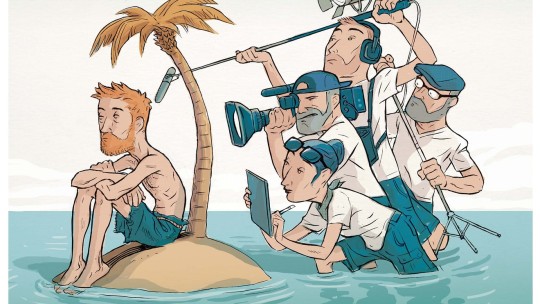
Ultimately, with Reality TV growing at the pace it is spreading away from TV and being found exclusively on social medias I believe it is evident that the Reality TV genre is here to stay and if anything will only grow bigger with both more shows being produced and bigger fanbases growing. It is evident that although Reality TV is deemed as the most hated TV genre it has still managed to see a steady incline in viewers/fans over the years and will continue to do so with the expansion of social medias.

References
Murray, Susan, and Laurie Ouellette, editors. Reality TV: Remaking Television Culture. NYU Press, 2009. JSTOR, www.jstor.org/stable/j.ctt155jm1m. Accessed 2 Apr. 2021.
B&T. Nine Wins 2020 TV Rankings On Back Of Reality Show Success – B&T. [online] Available at: www.bandt.com.au/nine-wins-2020-tv-rankings-with-reality-show-success/[accessed 2nd April]
0 notes